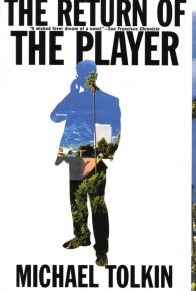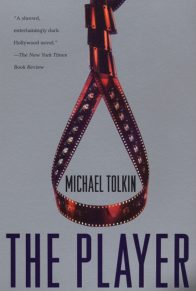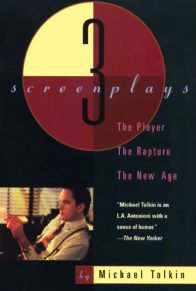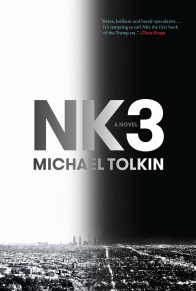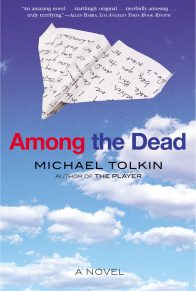When he was twenty, Tom went to a party where a witch told him, “You will be found out.” Some years later, before he was caught, Tom was on a plane to Jamaica.
He had two little girls. Perri was nine and Alma was four. Tom wanted to take the family skiing, but his wife, Rosalie, thought that the routines of ski school, in and out of the cold, the agony of lost mittens, the struggle with ability, would give Alma tantrums, so Tom agreed with–or rather, conceded to–his wife, that the children would be happier in a warm ocean, on an island like Jamaica; and, never having been there, they went. They planned to stay for two weeks.
Rosalie accepted a travel agent’s recommendation for the Montego House because all of the hotel’s rooms were apartments, with a bedroom, small kitchen, and living room. The hotel assigned every family a baby-sitter, a local woman given the quaintly offensive title “Girl Friday.”
When Betty, who met them at registration and showed them to their apartment, proved cold and unhappy, Tom agreed with Rosalie that rather than talk to the woman about her bad mood, or ask the resort’s manager to replace her with someone who smiled, even artificially, they would keep her, so the children, in their first extended contact with a black woman, would have to fight for affection instead of collecting it as part of the Montego House all-inclusive package, along with free use of snorkels.
On the second day, Rosalie sent a postcard to the travel agent, thanking him.
Dear Otto,
It’s glorious here. The children are happy. You were right, the ginger beer is addictive.
Tom had his own sour opinion, too brutal for a postcard. Though he knew from all of his travels not to trust his ill humor on arrival until he had slept a full night, his first tour around the hotel, past the swimming pool, the beach, and the central bar gave him little hope that his mood would improve. He hated the Montego House for all the reasons Rosalie adored it, for what appealed most to a good mother: it was safe for children. Were Tom to send a postcard, he would have listed his complaints against the hotel’s bourgeois want of eccentricity, would have said that it was homey, with no sex, with none of the drama of sex. He’d seen the brochures for other resorts, with packs of horny modern women out for the orgy, and the men who hunt them, ballplayers, contractors, young doctors, guys with cash, guys who exercise so they can look like ballplayers. If this had been a family hotel for the very rich . . . but it wasn’t. Everyone at the Montego House was comfortable without being wealthy, and this annoyed Tom, because he had a lot of money and he could have afforded a first-class resort with a bigger pool and room service. It was Rosalie who chose this, to save her children from a luxury that would forever spoil them for modest pleasure.
When Tom said to Rosalie after that first cruise around the grounds, “You know what this is? I figured it out. There’s a brilliant conspiracy out there that had us committed to a minimum-security prison for families,” Rosalie told him to shut up.
It was easy for Tom to comply, since there was so much that he kept secret from his wife.
He didn’t play tennis, he didn’t play golf, but he did have a sport. On every vacation he always found a woman to secretly cast in a complicated story he built for his own entertainment, he always fixed his attention on a stranger in order for the trip to develop within its morbidly predictable and cloistered order the possibility of possibility, no matter how imaginary, from which he could draw some distracting energy. He had never had an affair after marrying Rosalie, and had very little experience with women before her. No, the whole structure of the game was hidden from the world. He never crossed the boundary to the point where fantasy made a dent on matter, and he always burned, by vacation’s end, his dense unwritten novel of travel, secret meetings, murder, punishment, and passionate enlightenment.
He understood that he might be a very sick man. He persisted anyway.
Looking for a secret movie star, Tom strolled by the pool, dividing the mothers into categories. There were the good mothers, always attentive about settling their children’s quarrels, married to the good men, fathers who changed diapers, threw the ball, and, without being asked, went back to the room for sunscreen; a few good mothers married to the wrong men, fathers who played deaf to their children’s appeals for play; a few sets of bad parents whose children screamed and cried and got their way; and one divorced mother with her quiet son. What an awful place for a divorced mother! There wasn’t a single man anywhere, not even a single father. Of course not; the single dads were at the sexy hotels. All of the men at the Montego House were with their wives. They were here because they could afford nothing better, and they could afford nothing better because they were good parents, because they put family ahead of work, taking the world as it came to them, and this timidity or acceptance, the frame in which they embraced their lives, outlined the limit of their ambition. Tom found them, like all the genially cooperative people of the world, impossible to talk to. “I can’t talk to these people, they’re so emotionally sterile,” he said to Rosalie, which she took as the start of a fight: “I told you not to do this to yourself. Have a drink and relax.”
He couldn’t follow her advice because he wasn’t drinking, which made things worse, made him unappealing. Standing at the bar sipping cranberry juice and tonic, when he casually mentioned to a few of the dads that he was unhappy with the Montego House, he was disappointed because no one agreed with him or even wanted to hear his theories about the trapped almost-rich. He felt their suspicion. They assumed he was a self-declared recovering alcoholic, and since the hotel’s open bar served good brands and the bartenders poured generously, the guests, within their own dull moderation, drank more heavily than they did at home. What they didn’t want was anyone’s disapproving eye on their third daiquiri of the morning. So it was Tom, sober, who ranted like a drunk. And he had stopped drinking for only a month before the trip, to see if his life felt any different, to see if he could stop the unending noise of his mind. Even though he rarely finished more than two glasses of wine at dinner once or twice a week, he felt polluted by the world, and toxic to himself, and so he wanted to purge his system. After a week the experiment yielded a result: Tom saw no real difference between having a drink and not. Worse, with every desire for a drink that challenged his abstention, he attacked himself using a fervor equal to his self-flagellation for the mildest hangover. If there was no difference, why not enjoy a beer and take a vacation from himself? Even Rosalie told him to drink: “You don’t like it here because you’re sober for no reason. You’re not an alcoholic. You can drink. Have a drink, Tom.”
He said he would think about it. He knew that the useless asceticism of his self-denial was feeble, a bargain virtue. By holding to his sobriety for the benefit of his detachment, Tom watched the dissipation of his integrity. So why not have the drink now?
Still he resisted escape; he preferred the constant nudging awareness of his need for a drink, just one or two beers. When he forced sobriety, everything he saw caught an echo or reflection, depending on his perspective, of the broken promise that holds time to substance. These stupid contradictions were lost on the other guests, who smelled his contempt for them and stayed away, sitting in the shade of the thatched roof over the bar, laughing with the bartenders.
So he would pretend to be drunk, to himself. He remembered the merciful benefits of a rum at lunch and located within the streams of his scorn toward everyone there a sappy appreciation for these dull wives, and forged from this a maudlin horniness for them, and convinced himself like a lush at closing time that their unimaginative faces, inclined to magazines and weak novels, hid the greatest perversions. He would save them from their sex-panicked husbands. In his counterfeit booziness, staggering between sympathy and sadness for the mother hens of the Montego House, he scanned the air for signals of lust or desire, hidden in this palace of familial sincerity that cried out to the observant, “I do not love the man I married.” What to look for? What mattered? Which of you wants sex in a closet with a stranger? Yonder woman whose expensive haircut matches her ironic Jackie-O-with-Ari sunglasses, makeup during the day, and an especially pretty bag filled with fashion magazines and French suntan lotion? Maybe. How slowly did some women lower themselves to a chaise, how carefully did they arrange their bottles of water, magazines, and tubes of sunscreen? Did they smile inwardly at an idea of their own, not to be shared, a perception, a memory, a retreat from the impossibly uncosmic irritating banality of a swimming pool crowded with spoiled children? The woman reading Architectural Digest, why was she a likelier pervert than the woman reading Cosmopolitan? And the wider the brim, the more expensive the sunglasses, why, Tom wondered, was he so sure that these details advertised overdue wickedness? Or was theirs a bogus decadence, their broad displays of catalog libido and commercial sensuality a sign of the weakness of their impulse to sin? Were these indications of style only a more refined indication of panic and loneliness, which amplified these mothers’ regretful desires into a drama they never really wanted, a drama for which they had no genuine aptitude? Or did they have aptitude but no worthy partners? He pitied the women for their men. What is it about this level of society that produces such dull men, the men of the middle? And why am I different? he asked himself. I can smell depravity on the unhappy wives because I can read the lock on a secret, because I have a secret. Yes, how many of the men here, like me, are ten years past unpunished felonies?
When he was two years out of law school, Tom had joined an old friend, Paul Farrar, in a swindle. Farrar knew three doctors willing to go along on a risky venture, faking accident claims to take money from insurance companies. To complete his plan, Farrar needed a few lawyers. Just as he recruited Tom, and Tom recruited another lawyer, so Farrar’s other recruits added the few necessary allies. Tom never knew the names of everyone involved, but Farrar had done his homework carefully and managed the crime with a cautious limit on greed; after the gang made enough money, the partnership broke up. Farrar, a genius of persuasion, insisted that each man at the start admit the evil nature of the endeavor, with no justification, no cynicism; no one could say that the insurance companies deserved this. “We’re stealing,” said Farrar, “that’s all we’re doing. We’re going to make some money, and then we’re going to stop. And to settle the accounts a little, we’re going to give some of that money back to the world, as charity.” He insisted upon this.
The swindle lasted ten months. The alliances within the group had never been more socially complicated than the conspiracy needed, so they hardly ever met when it was over, having little to talk about except their history. Among the people who knew one another already, Farrar discouraged social connections, on guard against friendships among the wives, which could promote more time shared by the men and might lead to private chats beside the barbecue, one testing the other to see if he was game for another round of big money, which might lead to further crime, which might lead to arrest and then betrayal and the exposure of this careful fraud, and Paul Farrar’s arrest. Tom was certain that Farrar would have killed to save himself. Seven years on, the statue of limitations had passed and they were free in the eyes of the law. Farrar joked, “With time off for good behavior, we’d be getting out about now.”
Tom liked to talk to Farrar about the implications of living with the memory of sin; it was one of Tom’s favorite subjects, how the knowledge of an unpunished crime grinds a lens through which the world looks small and more easily managed. Paul noted to Tom that of the four marriages in the group, there had been no divorces. “I picked right,” said Farrar. “Everyone I picked was stable.”
They knew that guilt destroys some men, and Tom credited Farrar for refusing to pretend that their occasional streams of bad feeling weren’t guilt. Each of them discovered that the world made more sense, knowing that anyone they met might just as easily have a secret such as theirs. Over the years, as the crime passed into a dimming legend even in his own dossier, Tom confessed small pieces of it to new friends, or alluded to his villainous past in a way that gave the impression he was talking about a few years wasted on drugs, hardly a special event, but he cast his net with a careful intonation when he wanted to test a hunch with someone he suspected of his own criminal story. He didn’t expect anyone to suddenly tear the wrapping off his secret any more than Tom would have opened up. If the other was as vigilant against exposure as Tom, he would, with tact and speed, move the discussion to neutral territory. Then Tom knew. Skilled deflection was the giveaway.
What if he pushed himself to one of the women by the pool and said straight to her face, “Listen to this carefully: a lot of people don’t get caught, and sometimes there’s no way to look at a man and guess his crime, but let him lift the veil on his own past, just a little, and when you know your own felony, you can see it on him like a tattoo.” What then?
Five days into the vacation, and none of the women had yet dragged a fantasy out of him. And then on the sixth day, the airport bus delivered her.
With hair short as Joan of Arc’s, the woman on whom Tom would fix his fantasy sat with her feet in the water, reading an ancient edition of Sense and Sensibility. The book had a faded hunter-green cover, with the title embossed in a chipped gold. She wore a wedding ring and a small diamond. Tom was jealous of the woman’s husband. Here was a woman careless enough to risk staining a rare book with suntan oil, just for the pleasure of reading a nineteenth-century novel in a nineteenth-century binding. What a wife she must be! What a companion! How well must she encourage her husband if she allows herself such a violation of custom. There’s a husband who can share his secrets with his wife! But why are they here? The husband of such a woman, wouldn’t he be a greater success than the rest of the men at the Montego House, elevated by his wife’s beauty, confidence, taste, and careless attachment to precious things, wouldn’t he have the wealth for a suite at the Four Seasons, or a villa with a staff and room for his friends? Or was Tom’s little movie of their success the payoff for an ambition she could have helped her man achieve, but together, servants of the highest moral style, they had rejected? Did she teach him that she was all the prize a man could want? Did she reward him for leaving the office in time for dinner with the children, helping them with their homework, reading poetry in bed? She could love him so well that her love tamed his striving after the real cost of the Four Seasons’ fluffy towels and twenty-four-hour in-room dining. There’s a noble wife for these greedy days, there’s the woman of valor! Take the rare book to the beach because you want to. Don’t work so hard that you miss the pleasures of the moment.
Tom watched her turn the page, slowly. From what service of devotion other than a love of precious things– like this book–and the freedom to lose them, damage them, could he recognize a woman whose conversation would surely slide from erudition to the capricious to the risqu” to bed? She was everything he had ever needed from a stranger. The intrigue of her signs melted his brain; her combination of fashion and literature, narcissism and intellect, made her the closest thing at the beach to Paris. Had she cut her hair for comfort? He hoped not. He wanted her to have almost shaved her head for a purpose so complicated that her motivation was deeper than she might know; he wanted her to have cut that gorgeous hair in defiance of the world, to deny the raving famished beast of the world the morning milk of her beauty. He might have broken a window with his hand if he thought that by cutting her hair this woman’s sacrifice was also cruel, to protect her man from the sin of adoring something she could lose, to ruin the revered crown of her beauty and diminish her beloved husband’s strength for work, destroying his shot at marriage-wrecking wealth.
Tom tried to read her more deeply and studied her for ten happy minutes like a birdwatcher in a rookery. Now the full scene at the pool, so loud and annoying without this woman, giggled with the life of children in water. Nothing had changed except Tom’s fervor.
Without warning, the woman’s children hugged her from behind: her daughter, Tom guessed six; and a boy, probably four, whose Girl Friday brought them to her for just those kisses, on their way to the children’s buffet. When they toddled off, the woman with short hair set the book down and leaned back to do stomach crunches, lifting her feet out of the water and pumping her legs in and away. Was she showing off? Good. Was she bored? Even better. What theater did she hope the attention would open? He tried to add up what excited him about her, and weave into this the elements of the day, the heat, the heavy wet air, and the fumes of his second imaginary rum punch. Taking these things together, he convinced himself that she was a rare free spirit with a profound inner life like his, and if so, she would be available to him if he found the right words.
When he passed by, she stirred a little, and he knew that she knew, without knowing exactly why, that someone wanted her. He was certain that the Jane Austen of Jamaica felt all of this secret attention as a subtle pressure in the air from Tom’s direction, and from then on that day, even as his furthest stray thought retrieved a mental image of her when she was somewhere else in the resort, she would look over her shoulder.
In bed that night, Rosalie said, “You’re finally relaxing.”
“Yes,” he said. “It always takes me a while. I’m sorry.”
“That’s why vacations last a few weeks. You work hard, you need a lot of time to find yourself.”
The next afternoon Tom saw Jane Austen’s husband walking on the beach with the little boy and girl. Tom thought at first that this fat man in a pink Lacoste shirt, lime-green Bermuda shorts, brown socks, and black sandals, this sweating parody of the revolting American tourist, was only a friend, but the little boy called him Daddy and held his hand, chattering about octopus tentacles, and what happens if you cut off the tentacle of an octopus, and does the tentacle grow back? So Jane Austen, the best inspiration this stupid resort could offer him, was married to an oaf. If he was going to give himself a fever over a stranger, he wanted a worthy rival to illustrate the dust jacket, a handsomely corrupt pirate standing defeated in the background while Tom made love to his lady. He wanted someone who threatened him, a lean man with the perceptive gaze of a flight instructor, a judge of character, a man who could size you up and, by the way you stood at ease or agony when no one was watching, judge even your father. But then a thought gave Tom fuel for his fantasy: the fat man and Jane Austen were lying, this marriage was all for show. She was his slave and would never see her real husband again, that man of muscle and sinew, if she didn’t cooperate. Tom found himself rescuing Jane Austen from the demonically obese kidnapper only to return her to her grateful thin husband, a pediatric eye surgeon working among the poor in Haiti.
If this were so, thought Tom, how could I signal to her that I was here to help? I could tell her about Ira. I could sit beside her at the pool, and I could say, “I used to have a friend named Ira. He inherited a construction business from his father. He was always late to meetings, and he was lazy and slow and the business failed. He was fat. I’ll tell you the truth, I used to bore my wife with all the excuses I made for Ira, because Ira was my friend. Even though he came to his mother’s funeral in a hooded blue sweatshirt, I wanted to help him. One day he asked me to loan him money so he could buy an industrial coffee roaster, so he could open a coffee business. My wife said that if I wanted to throw my money away, I should at least buy the industrial coffee roaster myself and then lease it to him, so if he went bust I’d have something to sell. Of course the business died, what do you expect, because Ira was a loser. I sold the machine at a loss, but this was good for me, a tuition payment on experience. In the difference between the price and the damage, I stopped justifying Ira’s failures. I stopped having sympathy for Ira. I stopped looking at his inanimate bulk as the expression of some pain that made him such a disaster at business, at love, at friendship. Would you like to know why? Because of my wife. My wife didn’t see obesity as a problem. She pointed out to me the many fat men in the world who transcend all of Ira’s most unfortunate attributes: a thick nose, small eyes, big stomach, dying hairline; men with stunning women, maybe their wives, maybe just women they fuck. I saw these men, these larded medieval Jew barons, I had always seen them, but denied the implication of what they proved, to protect my buddy Ira.
“No longer. I’m a connoisseur now, and we have a name for these men: my wife and I call these men the Realized Iras. Realized Iras are otherwise grotesque men of commerce whose vivacious appetites make them sexually attractive, whose expansive capacities for money, food, pleasure, and friendship intimidate the world. And if I were going to leave my wife for you, Jane Austen, even in fantasy, your fat man would be a Realized Ira, not the sunburned sloth who made you his slave. Your alleged husband has no tone, no buoyancy, none of the elastic grace of the Realized Iras, and he has none of that grace in his heart,” which is why Tom killed him for what he did the awful night of the Reggae Party, after Tom had already resigned his tangled daydream.
Excerpted from Under Radar
©2002 by Michael Tolkin. Reprinted with permission from Grove Atlantic, Inc. All rights reserved.





